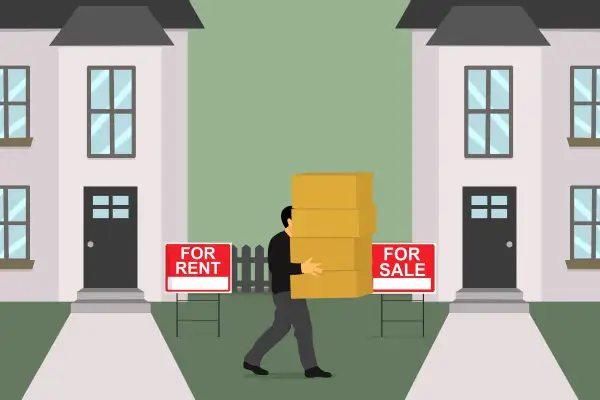8 Signs It’s Time to Stop Renting and Buy

With mortgage interest rates at an all-time low, many people — mainly first-time homebuyers — are asking whether this is the right moment to stop renting and buy. When comparing the two options, the decision to buy will ultimately depend on a range of factors like your finances and future plans. Read below to find out if buying a home is right for you.
If, on the other hand, you've already decided that you want to buy a home, our best mortgage lenders page can help you find and compare the best lenders. You can also use our mortgage calculator to estimate how much you can expect to pay for a new home based on your credit rating, down payment and loan type.
- 8 Signs You're Ready to Stop Renting
- Other Reasons to Stop Renting
- Renting vs Buying
- Bottomline About Renting vs Buying
8 Signs You're Ready to Stop Renting
1. You're out of debt
Being out of debt means you are more capable of taking on the weight of a home loan. You don't need to be totally debt-free, though. Between student, auto, and medical debt, mortgage companies are aware that being debt-free is unrealistic for most borrowers.
You should be able to buy a home so long as your accumulated debt is lower than your income. This is where your debt-to-income ratio (DTI) comes in. DTI shows how much of your monthly income is being used to pay off debts: the lower your ratio, the more likely you'll be able to afford a mortgage.
To calculate your debt-to-income ratio, divide your current monthly income by your monthly debts (student loans, credit cards, auto loan) or use Money's handy debt-to-income calculator.
2. You have the down payment
If you've saved enough to afford a sizable down payment, you're on the right track for homeownership. Twenty percent (20%) should be your goal, but you don't need to provide that big a down payment — conventional loans accept down payments of as low as 5% and you can get an FHA loan with a 3.5% down payment.
You may not need a down payment at all if you qualify for specific government-backed loans. Neither USDA loans nor VA loans require a down payment, but you must meet specific criteria to qualify. Take a look at our best VA loans page if you're interested in this type of mortgage.
3. You have an emergency fund saved up
You should consider purchasing a home if you have an emergency fund saved up. Experts recommend having three to six months' worth of expenses saved in addition to the down payment and closing costs. Having an emergency fund shows that you are financially prepared to shoulder any unforeseen expenses and household costs that surface after having bought your home.
4. You have good credit
The higher your credit score, the better the chances of securing a home loan. A credit score determines how much money you can borrow, how much interest you'll be paying and what loan programs you qualify for.
Having a credit score of at least 690 is a good start, but borrowers should aim for a score in the 700s to get the lowest interest rate. If your credit score is less than 690, consider renting a while longer while you take steps to improve your credit score.
5. You have employment stability
Employment history is another important sign that you are ready to buy a home. Lenders typically prefer borrowers who have spent two or more years working in the same company — or the same field of work, at least — because job stability suggests a steady income and financial security. Having the same job, income and pay structure for 24 months or more also makes the process of determining your average income more straightforward for lenders.
6. You have a steady source of income
During the underwritten process, borrowers must show proof of two years of income if they are to be accepted for a home loan. Employees who have a day job can prove this easily enough with their W-2 forms and two years of tax returns. However, freelancers, gig economy workers, business owners and other self-employed individuals must show proof of two years of income through their W-2 forms and 1099 forms.
7. You can afford the costs of a purchase
Low debt, substantial savings, and a steady income are important signs that you are ready to take on a mortgage. Nonetheless, a home loan is only part of the costs you must cover: you also have to pay for property taxes, private mortgage insurance, closing fees, maintenance fees, and homeowners association fees, not to mention any repairs or upkeep costs that may come up in the future. Lenders prefer borrowers whose budget can comfortably afford these costs, that is to say, without significantly dipping into their living expenses.
Our home affordability calculator can help you identify how much house you can afford on your income and budget.
8. Mortgage rates are low
Though mortgage rates have risen during the past couple of months, they remain at all-time lows. Low rates are a strong indicator to buy, and current mortgage rates are ideal for purchasing a new home. Buying a home while rates are low is a big deal since you'll be paying less in interest.
Other Reasons to Stop Renting
The other reasons to consider buying vs renting consider your personal preferences and goals. If you find yourself aligning with the following goals but don't meet the signs highlighted above, it might be time to start working on your finances.
Creating a savings account for your down payment, building credit, or settling your debts, are all great starting points in the home buying process.
You want more space
The amount of space you want or need will depend on your circumstances. If you're starting a family, have pets, or need room for your job or hobbies, purchasing a home can give you the freedom to customize your living space as you see fit.
You want control of your surroundings and environment
Renting comes with a lot of caveats and limitations. You don't have complete control of your surroundings while living under a landlord, since you must consult them before making any changes that could affect the market price of the rental property and the living environment of future residents. If you want a place that you can call your own to remodel and outfit however you like, you might want to consider buying a new home.
You found a neighborhood you'd like to live in for years
Sometimes, you fall in love with a community: the "look and feel" of its homes, the people who live there, or the practicality of its location. When you find a place you can see yourself settling down in for at least the next five to ten years, purchasing might be a good idea — especially if home prices are increasing in the area.
You're interested in a specific city or school district
Your reason for buying a home may be more practical, for example, if you've found a stable job in another city or want your kids to go to a specific school. Moving into this new location may be easier if you've rented in the area before and are familiarized with the environment.
You want an asset that may grow in value over time
Another practical reason to purchase a home is to make a long-term investment. In addition to the stability that they bring, homes are an asset that can grow over time unlike other large purchases such as vehicles and expensive electronics. Identifying a location or part of the country where real estate value is rising, or may rise in the future, is key for those hoping to invest in property.
You found a good deal
Say you've struck gold with an amazing deal on a house that meets — or surpasses — your expectations. Should you talk to the realtor and take the deal even if you aren't ready for homeownership yet? What if you are ready, and it's a great price, even if the home isn't exactly what you are looking for?
Answers to these questions will vary widely, but if you're desperate to stop renting and buy a home, it may be worth considering a less-than-stellar home for a great price. After all, you can always use the money you saved to build the home of your dreams down the line.
Renting vs Buying
Renting and buying both have their advantages and disadvantages. Renting offers flexibility and affordability, while homeownership brings tax deductions and home equity, as well as intangible benefits, such as stability and a sense of belonging.
Renting
- Easier to move in and out of your home
- Repairs are paid for by your landlord
- Not stuck with an asset that may depreciate in the future
- Renting prices can skyrocket due to inflation
- No tax benefits or wealth creation
- Bound to a landlord's rules and restrictions
Buying
- Complete ownership of the home
- Customizable living space, how and when you want it
- Cheaper than renting in the long run
- Sense of stability and growth within a community
- House maintenance is managed by the owner
- More difficult to move out
- Home prices may go down in the future
- Lots of costs: down payment, closing costs, maintenance, taxes, and fees
Renting vs Buying FAQ
When is the best time to buy a house?
The best time to buy a house will vary depending on your priorities. Homes are most expensive during spring and summer, but there are more choices to choose from. Between late summer and early fall is the best time for most homebuyers since there are still many houses on the market but far less competition.
During winter, the number of homes available for sale is greatly diminished, but buyers have greater negotiating power because fewer people are out shopping for homes.
Is it better to rent or buy a house?
What is rent to buy?
How do higher inflation rates affect renting vs buying?
Bottomline About Renting VS Buying
Just because you can buy a home doesn't mean you should. Renting doesn't mean you are throwing away your money, just like buying doesn't mean you are settling down forever. However, buying is a greater responsibility, so it's essential to evaluate your financial situation and then consider your goals before taking the plunge and purchasing a home. Above we have outlined the 8 signs it's time to stop renting and buy.
